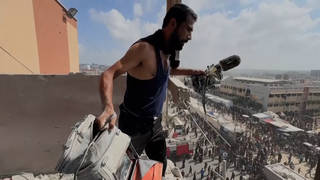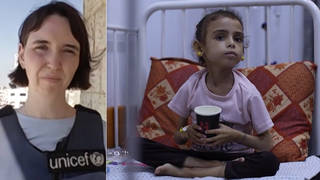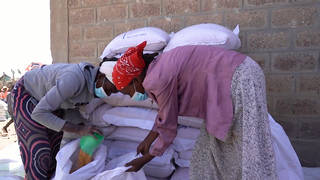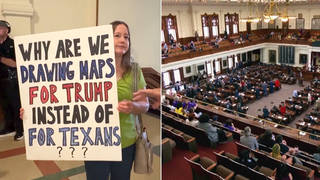
This week U.N. Secretary-General António Guterres is in Nigeria, where he warned Russia’s invasion of Ukraine is leading to a growing hunger crisis in Africa. A new report by Human Rights Watch finds the Russian invasion of Ukraine has worsened food insecurity, particularly for African countries that were already experiencing a hunger crisis. Russia and Ukraine are leading exporters of wheat and other grains, while countries such as Cameroon, Nigeria and Uganda are among the largest importers. With climate change and trade stalled by the coronavirus pandemic, “all these changes within the availability of food has sent the food prices to new levels,” says Lena Simet, senior researcher at Human Rights Watch. Advocates are calling on exporting countries such as the United States and Canada to “open their markets, to not introduce export restrictions, and provide essential grains at an affordable price to humanitarian organizations,” she adds.
Transcript
AMY GOODMAN: We begin today’s show looking at how Russia’s invasion of Ukraine is leading to growing hunger in many African countries that rely heavily on Ukraine and Russia for wheat and fertilizer. This week, the World Food Programme said nearly four-and-a-half million tons of grain are blocked in Ukraine’s ports. This comes as the number of people facing hunger at crisis or worse levels soared to unprecedented levels last year, passing a record set just the year before. That’s according to a newly published annual report by the Global Network Against Food Crises, an alliance that includes the United Nations and the European Union. U.N. food crisis analyst Luca Russo said the report does not yet factor in the impact of the war in Ukraine.
LUCA RUSSO: We don’t know yet what will be the effect of the Ukraine crisis on the overall global food insecurity. So this is something very important. So, what is very important for us is to make sure — and I’m talking on FAO — to make sure that we keep on monitoring the countries most at risk of acute hunger and famine, because at the moment, because of the attention that is paid to Ukraine, there is a risk that we simply forget about other crises.
AMY GOODMAN: The new report finds nearly half a million people in Ethiopia, southern Madagascar, South Sudan and Yemen are already facing the most severe phase of acute food insecurity: catastrophe. On Wednesday, U.N. Secretary-General António Guterres addressed global food security during a meeting with the Nigerian President Muhammadu Buhari. They both spoke to reporters in Nigeria’s capital, Abuja.
SECRETARY-GENERAL ANTÓNIO GUTERRES: There is really no true solution to the problem of global food security without bringing back the agriculture production of Ukraine and the food and fertilizer production of Russia and Belarus into world markets despite the war. And I am determined to do everything to facilitate a dialogue that can help achieve this objective.
PRESIDENT MUHAMMADU BUHARI: Coming at a time when the entire global attention is focused on the unfortunate situation in Ukraine, we in this region are feeling already that the world is forgetting about us. There can be no better assurance that the world is with us as we confront extremist terrorist organizations, hunger and the enormous problems of dealing with millions of displaced people than this important visit.
AMY GOODMAN: Russian and Ukrainian imports account for 30% of all African wheat consumption.
For more, we’re joined by Lena Simet of the Human Rights Watch. She is their senior researcher and advocate on poverty and inequality, lead researcher for the new report, “As War Continues, Africa Food Crisis Looms.”
Welcome to Democracy Now!, Lena. It is great to have you with us, but under such dire circumstances. Can you explain how the war has exacerbated not only the looming crisis but the catastrophe that is taking place today in Africa?
LENA SIMET: Thank you for having me.
Yeah, so, the war in Ukraine has led to huge food shortages in many domestic markets in several African countries, but also sent food prices to new levels. If we look at some of the food price indices that the United Nations releases, the level in March has been the highest since it has been recorded in the 1990s. And so this has huge implications for domestic markets. In Nigeria, for example, the price of some essential staple foods, including wheat, jam, barley, has increased by more than 30% in this last year and has further heightened since the war began.
And so, the problem really is that many people living on already low incomes that have been affected by the pandemic, that lost income then or economic activities, are now struggling to afford these increased prices for food and, therefore, skip meals, go hungry and also reduce other expenses essential to fulfilling their rights, including healthcare or education.
NERMEEN SHAIKH: Lena, could you elaborate on that? I mean, as the report points out, as you’ve said, even prior to the war, so many countries in Africa and also elsewhere were facing acute food insecurity, in part because of the pandemic. Could you explain how the pandemic exacerbated existing conditions and what other — how exactly that happened and what other factors led to this worsening crisis, and now catastrophic following the Russian invasion of Ukraine?
LENA SIMET: Yeah. So, if we look at the numbers in 2020 around food insecurity, we see that many regions within Africa — so, West Africa, East Africa — had already extremely high levels of food insecurity. So, I’m talking seven out of 10 people, six out of 10 people, so 60%, 70% of the population experiencing food insecurity. And so, the pandemic has exacerbated the situation further since it disrupted trade. It disrupted trade flows within the region also, so not only globally, and therefore, there were already increasing prices in domestic markets. We also have to look at climate change events that occurred during this time — for instance, droughts in Kenya that reduced crop production. So, all these changes within the availability of food has sent the food prices to new levels. And so, the war in Ukraine further exacerbates the situation since the two countries are among the top five global exporters of some staple foods, including vegetable oils but also cereals, and, as you heard before, account for about a third of the world’s wheat exports.
NERMEEN SHAIKH: And, Lena, can you talk about the countries that have been most affected in Africa and what conditions there are on the ground?
LENA SIMET: Yeah. So, the report that we released last week looked specifically at the situations in Nigeria, in Cameroon, as well as in Kenya. And here the situations are quite dire, where, again, six, seven out of 10 people are experiencing food insecurity and are not having enough to eat or enough quality food. And so the implications are huge also for the long term, since it may affect economic well-being in the years to come. So it’s not only an immediate emergency, but also long-term.
But, generally speaking, I would say the countries most affected in the regions are those where government budgets are already quite tight and that have taken on more debt as the pandemic progressed, which limits their ability to respond to this emergency situation in providing more food or financial assistance to their populations and where food insecurity was already very high.
An additional layer that I should mention is also that some countries, like Cameroon, have over time shifted their agricultural model and have depended more on food imports rather than the domestic production. So the countries that are very import-dependent are now the ones that are particularly affected by these disruptions in the global commodity markets.
AMY GOODMAN: Lena, can you talk about solutions that are being proposed, and also if you are seeing that the increased funding for weapons in Ukraine is being taken directly from humanitarian relief in places like Africa?
LENA SIMET: So, in terms of the solutions, we are calling for more economic — so, financial — assistance going to countries in need. We also call for more social protection for people on the ground, which means providing them a safety net in situations where food is getting more expensive, which many people can’t afford. And this includes, of course, the question around global aid: Where is it going, and can we shift in these crisis modes? Here again, I need to point out the danger of the increase in the global food prices that is presented to organizations like the World Food Programme, which gathers — or, used to gather 50% of the wheat supplies in other countries from Ukraine and Russia. So that has been disrupted enormously. So what we are calling for is on other exporting countries, like the United States, Canada and other countries, to also open their markets, to not introduce export restrictions, and provide essential grains at an affordable price to humanitarian organizations so they can further support countries and populations in need.
NERMEEN SHAIKH: And finally, Lena, the report points to the role of international multilateral financial institutions like the World Bank and the International Monetary Fund. Could you explain the role they might play in exacerbating the crisis, and what you think they ought to do instead, what they can do to alleviate it?
LENA SIMET: Yes. International financial institutions like the IMF and the World Bank play a huge role in supporting countries in times like these with loans and financial support in responding. However, there is a huge concern that many of these packages come with strings attached, calling for austerity measures in the near or more distant future. So this could lead to cuts in social spending, in education, in healthcare. These are practices that we’ve seen in the past conducted by such organizations, and we are calling on them to look for alternative ways to recuperate some of these debt levels. And that could be done by more progressive taxation measures, corporate taxes, addressing tax avoidance and tax evasion — so, instead of putting the burden on people who are already suffering the most and people in poverty, to search for alternative situations and avoid austerity that are harmful to human rights.
AMY GOODMAN: Lena Simet, we want to thank you for joining us, Human Rights Watch’s senior researcher and advocate on poverty and inequality. We will link to the report, “As War Continues, Africa Food Crisis Looms.”
Coming up, the European Union has unveiled a proposal to ban all Russian oil imports by the end of the year. We’ll go to Ukraine to get response. Stay with us.












Media Options